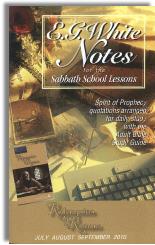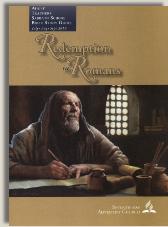|
||||||||||||||
Commentary on "All the Rest Is Commentary"
Day 3: Monday, September 20, 2010 - With What Measure You Mete
Overview
We are to be careful about how we judge others, today’s Lesson says, because we ourselves so often do the same things, and we thereby judge ourselves. Jesus said that the measure by which we judge others will be measured to us. We will all stand at the judgment seat of God, as Paul says in verse 10. Each one of us will have to answer for his own deeds.
The Lesson then cites vs. 14, and asks us to be “keeping the context in mind.” Paul says,
“I know and am persuaded in the Lord Jesus that nothing is unclean in itself, but it is unclean for anyone who thinks it unclean.”
About this text, the Lesson says, “the subject is still foods sacrificed to idols. The issue is, clearly, not the distinction between the foods deemed clean and unclean.” About such matters, the Romans were not to violate the consciences of each other, even though eating consecrated food was not unlawful in itself.
Observations
The Lesson is right to point out the dangers in judging others, and that we should carefully avoid violating the conscience of another person. However, Paul gives us very deep reasons for not despising or judging our brother.
- “God has welcomed him.” We are asked to welcome our brother who is weak because God has already welcomed and accepted him. This is the doctrine of justification by faith alone, by grace alone. “Who shall bring any charge against God’s elect? It is God who justifies. Who is to condemn? Christ Jesus is the one who died.” Rom. 8:33, 34 Judgment of other believers is not our responsibility, for we are not their masters. What a relief this should be! All judging is placed on the One who became sin for us. Judging is not our place, for we are not God.
- “It is before his own master that he stands or falls. And he will be upheld, for the Lord is able to make him stand.” Here, Paul is speaking of the believer being upheld until he is made, by God’s grace, to stand in the final judgment. When the day of God’s wrath comes, who shall be able to stand? At judgment day, the weakest, shakiest sinner, if he takes hold of the Son with his microscopic faith, will be counted righteous and beloved by the Judge of all the Earth. He will be upheld and will stand on that day.
“Through Him we have also obtained access by faith into this grace in which we stand, and rejoice in hope of the glory of God.” Romans 5:2
The Lesson states that the subject of Romans 14 deals only with foods offered to idols, and that “The issue is, clearly, not the distinction between the foods deemed clean and unclean.” However, Paul states in verse 14 that he is “persuaded in the Lord Jesus that nothing is unclean in itself,” and in verse 20 that “everything is indeed clean.” Since Paul mentions clean and unclean foods twice in this chapter, it is fair to assume that he is indeed talking about the distinctions between clean and unclean foods. It is arbitrary for the Lesson to state otherwise, and it contradicts a plain reading of this passage.
The laws from Leviticus regulating the eating of clean and unclean foods are not applied in the New Testament by Jesus, Paul or any other NT writer. In Mark 7, Jesus states that nothing that enters a person can defile him, but what comes out of his mouth, and thus he declared all foods clean (Mark 7:15-19).
Adventist theology has claimed that the “ceremonial laws” were abolished at the Cross, yet they believe that many of those same laws are still in effect, such as the food laws. Jesus in His Gospel has not placed that yoke upon us, so we are to stand firm, and not submit again to such a yoke of slavery (Gal. 5:1). In I Corinthians 10:23, Paul says “All things are lawful, but not all things are helpful.” He told Titus, “To the pure, all things are pure; but to the defiled and unbelieving, nothing is pure.” Titus 1:15
The word used for unclean is koinon, also meaning common, defiled, unholy, profaned. When Peter saw the sheet full of all kinds of animals let down and was commanded to eat, he refused, because he had never eaten anything koinon. God told him, “What God has made clean, do not call common” (Acts 10:15).
Some will claim that God wasn’t talking about food in Acts 10, but the Gentiles that Peter was about to meet. However, the vision was perfectly well-appointed to challenge Peter’s prejudice of the Gentiles. The Levitical food laws which he carefully kept were designed to keep the Jews separate from the corrupting Gentile cultures and false gods. Food laws created alienation and even hostility between Jews and other peoples. When the food laws were abolished, the Gospel created reconciliation and fellowship.
Christians no longer are under the food laws, so that we who “once were far off have been brought near by the blood of Christ.” Eph. 2:13 Christ’s death has
“broken down in his flesh the dividing wall of hostility by abolishing the law of commandments expressed in ordinances, that he might create in himself one new man in place of the two, so making peace” (Eph. 2:14,15).
The Cross kills the hostility created by the laws of Moses, laws that would alienate us and prevent friendship with people who we feel are “common” and distasteful. For Christians, food is never a moral issue, but simply a private one for each of us to resolve for himself. With that news, we are brought near in peace to even the oddest neighbor with the most revolting habits.
Summary
- We don’t judge our brother because he is already “welcomed” by God, and because God is able to uphold him and make him stand at the judgment.
- Paul makes it abundantly clear that foods offered to idols, and the Mosaic laws of clean and unclean, are discussed in Romans 14.
- Jesus clearly stated that all foods are clean, that nothing he eats can defile him. Paul also says all things are lawful, and that for the pure, all things are pure.
- The Mosaic food laws were designed by God to separate Israel from the idolatrous nations. When people can’t eat together, they are alienated.
- Christ has broken down the dividing wall of laws that separated Jews and Gentiles, so that he might kill the hostility and bring reconciliation.
Copyright 2010 BibleStudiesForAdventists.com. All rights reserved. Revised September 20, 2010. This website is published by Life Assurance Ministries, Glendale, Arizona, USA, the publisher of Proclamation! Magazine. Contact email: BibleStudiesForAdventists@gmail.com.
The Sabbath School Bible Study Guide and the corresponding E.G. White Notes are published by Pacific Press Publishing Association, which is owned and operated by the Seventh-day Adventist church. The current quarter's editions are pictured above.
Official Adventist Resources
Standard Edition Study Guide Week 13
Teacher's Edition Study Guide Week 13
Easy Reading Edition Study Guide Wk 13
Search the Complete Published Ellen G. White Writings


